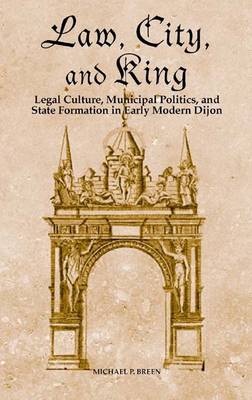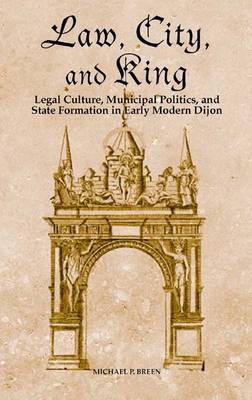
- Afhalen na 1 uur in een winkel met voorraad
- Gratis thuislevering in België vanaf € 30
- Ruim aanbod met 7 miljoen producten
- Afhalen na 1 uur in een winkel met voorraad
- Gratis thuislevering in België vanaf € 30
- Ruim aanbod met 7 miljoen producten
Zoeken
Law, City, and King
Legal Culture, Municipal Politics, and State Formation in Early Modern Dijon
Michael P Breen
€ 136,95
+ 273 punten
Omschrijving
An in-depth examination of political activities in early modern France that opens up new perspectives on the local workings of the French state and the experiences of those who participated in it. Law, City, and King provides important new insights into the transformation of political participation and consciousness among urban notables who bridged the gap between local society and the state in early modern France. Breen's detailed research shows how the educated, socially-middling avocats who staffed Dijon's municipality used law, patronage, and the other resources at their disposal to protect the city council's authority and their own participation in local governance. Drawing on juridical and historical authorities, the avocats favored a traditional conception of limited "absolute" monarchy increasingly at odds with royal ideology. Despite their efforts to resist the monarchy's growth, the expansion of royal power under Louis XIV eventually excluded Dijon's avocats from the French state.
In opening up new perspectives on the local workings of the French state and the experiences of those who participated in it, Law, City, and King recasts debates about absolutism and early modern state formation. By focusing on the political alienation of notables who had long linked the crown to provincial society, Breen explains why Louis XIV's collaborative absolutism did not endure. At the same time, the book's examination of lawyers' political activities and ideas provides insights into the transformation of French political culturein the decades leading up to the French Revolution. Michael P. Breen is Associate Professor of History and Humanities at Reed College in Portland, Oregon.
In opening up new perspectives on the local workings of the French state and the experiences of those who participated in it, Law, City, and King recasts debates about absolutism and early modern state formation. By focusing on the political alienation of notables who had long linked the crown to provincial society, Breen explains why Louis XIV's collaborative absolutism did not endure. At the same time, the book's examination of lawyers' political activities and ideas provides insights into the transformation of French political culturein the decades leading up to the French Revolution. Michael P. Breen is Associate Professor of History and Humanities at Reed College in Portland, Oregon.
Specificaties
Betrokkenen
- Auteur(s):
- Uitgeverij:
Inhoud
- Aantal bladzijden:
- 324
- Taal:
- Engels
- Reeks:
- Reeksnummer:
- nr. 6
Eigenschappen
- Productcode (EAN):
- 9781580462365
- Verschijningsdatum:
- 9/07/2007
- Uitvoering:
- Hardcover
- Formaat:
- Genaaid
- Afmetingen:
- 161 mm x 237 mm
- Gewicht:
- 666 g

Alleen bij Standaard Boekhandel
+ 273 punten op je klantenkaart van Standaard Boekhandel
Beoordelingen
We publiceren alleen reviews die voldoen aan de voorwaarden voor reviews. Bekijk onze voorwaarden voor reviews.











